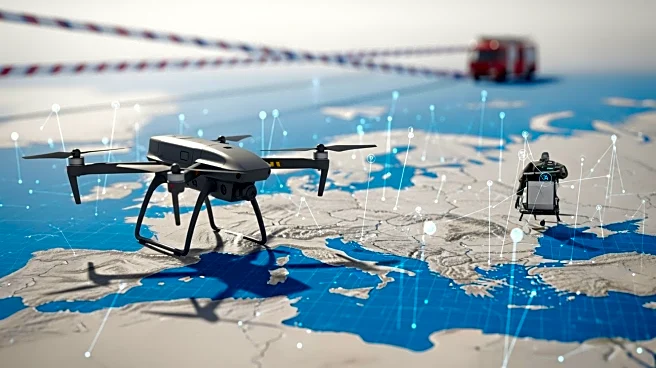What's Happening?
An analysis by Benjamin Jensen, director of the Futures Lab at the Center for Strategic and International Studies, suggests that drones could serve as an economical alternative to large U.S. Army units traditionally stationed in Europe. Jensen proposes
that instead of maintaining heavy mechanized brigades, the U.S. could deploy mixed drone units that offer flexibility and rapid deployment capabilities. These units would complement NATO's European members, who would continue to provide traditional combat arms. The concept involves using drones for strike, reconnaissance, and electronic warfare, potentially replacing the need for large garrisons and rotational force packages.
Why It's Important?
The shift towards drone-centric military strategies could significantly impact U.S. defense policy and military spending. By reducing the need for large ground forces, the U.S. could lower costs and increase operational flexibility. This approach aligns with current strategic priorities that focus on homeland defense and the Pacific region. The use of drones could also enhance NATO's deterrence capabilities against potential threats, such as a Russian invasion, by providing rapid and adaptable support. However, this strategy may face challenges, including the vulnerability of drones to enemy defenses and the need for technological advancements to ensure their effectiveness.
What's Next?
The U.S. Army is already exploring the integration of drones through the Army Transformation Initiative, which emphasizes the rapid development of small drones. Future steps may involve creating new drone units within the Army Reserve and National Guard, as well as repurposing existing aviation units. The potential deployment of drone brigades in Eastern Europe could serve as a demonstration of American support for NATO. Additionally, the strategy could be applied in the Pacific, where the logistical advantages of drones are particularly valuable. Ongoing discussions and evaluations will likely shape the implementation of this drone-centric approach.
Beyond the Headlines
The proposed shift to drone-based military operations could redefine traditional concepts of deterrence and warfare. By leveraging advanced technology, the U.S. could maintain a strategic advantage while minimizing the risks and costs associated with deploying large ground forces. This transformation may also influence global military strategies, as other nations observe and potentially adopt similar approaches. Ethical and legal considerations regarding the use of drones in combat will need to be addressed, ensuring compliance with international laws and norms.















